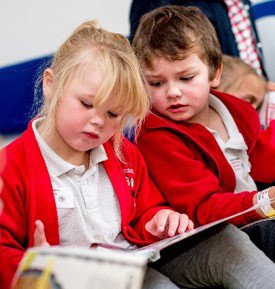
This report outlines findings from our 2022 Annual Literacy Survey, exploring young children’s reading engagement and access to reading materials at home.
This report is based on 8,210 responses to our Annual Literacy Survey from children aged 5 to 8 in early 2022. It includes findings relating to questions about reading enjoyment, confidence and frequency, reading attitudes and preferences and book ownership. It also includes data from 2,130 8-year-olds who answered as survey for older pupils in 2022, providing insight into reading motivation and how reading can support mental wellbeing.
Key findings:
Access to books at home:
- 4 in 5 (81.4%) children aged 5 to 8 said that they have a book of their own at home, meaning almost 1 in 5 (18.6%) children in this age group do not have a book of their own at home.
- More girls than boys said they have a book of their own at home (84.1% vs. 79.1%).
Reading enjoyment:
- 3 in 4 (75.4%) children aged 5 to 8 said that they enjoy reading, while 1 in 4 (24.6%) don’t enjoy reading.
- More than twice as many boys as girls don’t enjoy reading at all (7.2% vs. 2.9%).
Book ownership and reading enjoyment:
- More than 3 in 4 (77.7%) children aged 5 to 8 who have a book of their own at home said that they enjoy reading, decreasing to 2 in 3 (66.2%) of those who don’t have a book of their own.
Reading frequency:
- Only 1 in 2 (52.4%) children aged 5 to 8 said that they read daily, while 1 in 13 (7.7%) say they never read at all.
- More girls than boys said they read daily (56.9% vs. 48.2%).
The report also found that around 7 in 10 children aged 8 said that they read to learn new words (70.2%) or to learn new things (68.6%). In addition, 2 in 3 (67.4%) of children aged 8 said that reading makes them feel better, 64.1% said that reading helps them to relax and 64.0% that it helps them feel happy.